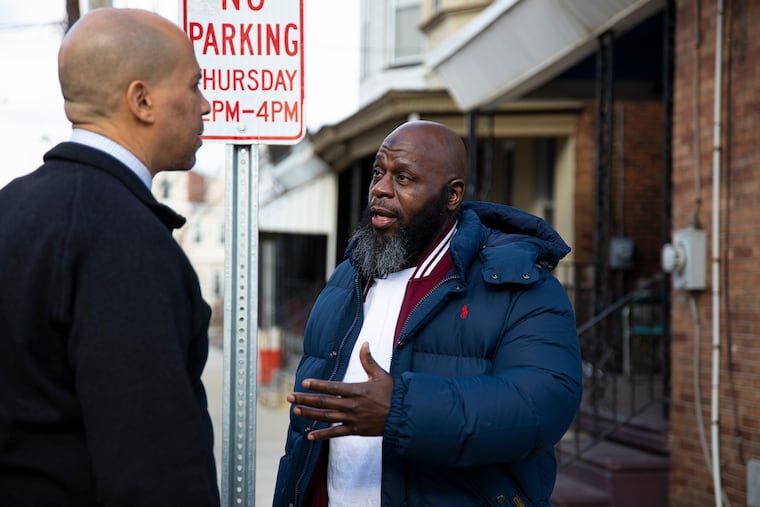Cory Booker visits a Camden rowhouse to meet N.J. man released early from federal prison under new law
U.S. Sen. Cory Booker visited a Camden man who was the first New Jerseyan released early from federal prison under the First Step Act, passed last year to reduce the mass incarceration of minorities.

Simian Paulk, now 50, was sentenced in 2001 to 21 years in federal prison as a repeat drug offender. Last year, he was one of the first New Jerseyans released under the First Step Act, which shortens mandatory minimum sentences for nonviolent drug offenses.
He was able to return to Camden, under home confinement, five months earlier than scheduled.
And Saturday, Paulk got a chance to meet U.S. Sen. Cory Booker, (D., N.J.), who was instrumental in getting the First Step Act passed, in January 2018.
Booker had wanted to meet someone who had directly benefited from the law. The men spent an hour together at the dining room table in the two-story rowhouse where Paulk lives with his mother, Evie, in the city’s Gateway neighborhood.
“He’s a game-changer,” Paulk said of the senator. “I’m nobody, but he is showing that he cares."
Paulk thanked Booker and urged the former presidential candidate to consider more legislation to reform the criminal justice system, beyond the First Step Act.
» READ MORE: Passing the First Step Act is the first step to restoring faith in Congress | Editorial
Among other things, the law eases the federal “three strikes” provision that Paulk was convicted under, gives judges more discretion to deviate from some mandatory minimum sentences, and bans prison officials from shackling pregnant women.
For years, the federal prison population has swelled, largely due to mandatory minimum sentences that disproportionately affected blacks and Latinos. “It is utterly unjust,” Booker said. He and others have advocated for sentencing reform measures that retroactively allow some, like Paulk, to be released early.
Paulk, the youngest of three, said he was expelled from Camden High School in the late 1980s. He sold crack cocaine and eventually began shooting up heroin. His legal problems began in 1989 when he was arrested during a drug raid and spent 2 1/2 years in prison.
Arrested again in 1994, he was sentenced to probation and sent to rehab. When he came home a few months later, he returned to his old lifestyle.
“I wound up hitting rock bottom,” Paulk said. “The streets were still calling me. I went back to selling drugs again and using drugs again.”
» READ MORE: Lt. Gov. Fetterman wants to use clemency to free wrongfully convicted. But the Board of Pardons is pushing back.
His third strike came in 2001 when Paulk, then 32, pleaded guilty to conspiracy to sell controlled dangerous substances. A federal judge sentenced him to 21 years and 10 months in prison.
In prison in Petersburg, Va., Paulk said he cut off contact with most people, except his family. He spoke weekly with his brother, Leonard “Pooh” Paulk, an inmate at a federal prison in Allenwood, Pa.
“It was my life,” said Paulk. I didn’t know how I was going to get by.”
Paulk was sent to a halfway house in Delaware in November 2018, just before the First Step Act was passed. He returned to Camden last March.
His return to society has been difficult, Paulk said. He earned a GED in prison, but finding work was not easy without a car. He recently landed a job as a forklift operator. Last May, he was caught in crossfire, he said, and a bullet remains lodged in his shoulder.
Paulk said he has been unable to get a driver’s license because he owes more than $13,000 in tickets and fees that accumulated while he was behind bars.
Booker promised to look into helping Paulk with the motor vehicle fines. He also wants to explore other ways to help former inmates make better transitions after being released, he said.
For his part, Paulk said he hopes to be able to give back to Camden by rebuilding gritty neighborhoods and speaking with young people to encourage them to stay out of trouble.
“It’s a lot of lost souls out there,” Paulk said. “I helped destroy these neighborhoods. Why not be part of the solution.”
He also hopes to advocate for his brother, Leonard, who was convicted in 2004 as one of South Jersey’s most violent drug dealers and is serving a life sentence for drug conspiracy. Prosecutors say Leonard Paulk, the stepfather of former NBA player Dajuan Wagner, laundered more than $1.6 million.